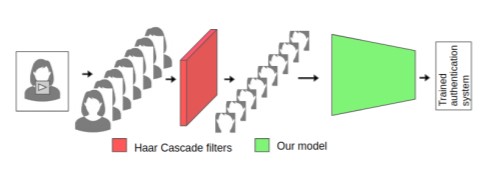
This is the code repository for the paper:
AUTHNET - A deep learning based authentication mechanism using temporal facial feature movements
Face recognition systems are typically based on a still image of a face picture and comparing it with the previous data to make predictions. The aim of the project is to develop a face recognition model that can strengthen the existing system by making use of facial movement patterns. It involves training the system on videos of the user uttering a predetermined password. Once that is done, the system can identify if a video of a person uttering a word is the correct person saying the correct password or not.
This can be used as a facial recognition system, where the system “recognises” the right person uttering the right password.
AuthNet was accepted for oral presentation at AAAI-2021 for the Student Abstract and Poster Program.
Find our paper on arxiv: https://arxiv.org/abs/2012.02515 and on the AAAI proceedings: https://ojs.aaai.org/index.php/AAAI/article/view/17933
The implementation is completely on jupyter notebooks. Hence, it is advised to download anaconda or miniconda packages to run this code.
- OpenCV for python
- Numpy
- Matplotlib
- Scikit-learn
- Tensorflow
git clone https://github.com/Mohit-Mithra/AuthNet.git
cd AuthNet\Cerberus
-
We have used a keras version of the pretrained VGGFace MatLab model available here. This model is needed for training the model as well as using the system. Add it to the 'Utilities' folder.
You can convert the model to it's Keras version yourself by running this. -
Inside the 'Cerberus' directory, create a new folder called 'Stored_Negative' and inside that folder add this file.
For adding the data, follow these steps:
-
Inside 'Cerberus' directory, create a 'videos' folder and the videos for the utterances. Note: This model has been built for 5 utterances per speaker.
-
Also, create an empty 'photos' folder with the following empty subfolders:
-> utterance 1
-> utterance 2
-> ...
-> utterance 5This folder will be populated with the sliced images of the video which will then be fed into VGGFace.
-
Now for testing, create a folder called 'test' inside 'Cerberus'. Then, inside the 'test' folder follow the same steps listed above.
-
Finally,run Cerberus/Cerebrus_training.ipynb. This will create the trained AuthNet model for that speaker.
Note: This version does not use Haar Cascade filters as videos taken from smartphones do not need any cropping. -
You can run Cerberus/Cerberus_testing.ipynb with different videos added in the 'test' folder to obtain predictions from the model.
Cite us:
@article{Raghavendra_Omprakash_B R_2021,
title={AuthNet: A Deep Learning Based Authentication Mechanism Using Temporal Facial Feature Movements (Student Abstract)},
volume={35},
url={https://ojs.aaai.org/index.php/AAAI/article/view/17933},
abstractNote={Deep learning algorithms are widely used to extend modern biometric authentication mechanisms in resource-constrained environments like smartphones, providing ease-of-use and user comfort, while maintaining a non-invasive nature. In this paper, an alternative is proposed, that uses both facial recognition and the unique movements of that particular face while uttering a password. The proposed model is language independent, the password doesn’t necessarily need to be a set of meaningful words or numbers, and also, is a contact-less system. When evaluated on the standard MIRACL-VC1 dataset, the proposed model achieved a testing accuracy of 98.1%, underscoring its effectiveness.},
number={18},
journal={Proceedings of the AAAI Conference on Artificial Intelligence},
author={Raghavendra, Mohit and Omprakash, Pravan and B R, Mukesh},
year={2021},
month={May},
pages={15873-15874}
}